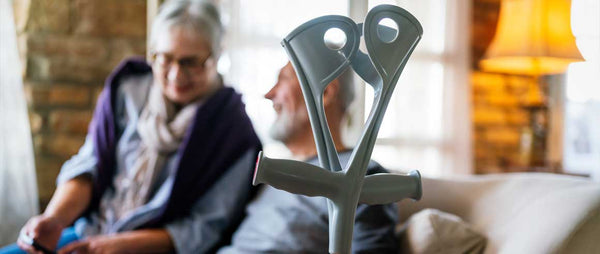As we grow older, our bodies become more sensitive to the effects of medication, and for many elderly people, daily prescriptions are essential for managing conditions like high blood pressure, diabetes, or chronic pain.
However, what many families may not realise is that medication and falls in the elderly are closely linked, as certain medicines, or even the combination of several, can increase dizziness, drowsiness, and loss of balance, which can make falls far more likely.
Understanding how medication can cause an elderly person to fall is important for protecting your loved one’s safety, so we’ve pulled together some useful information to help you make informed decisions when it comes to caring for your vulnerable family or friends.
Can medication affect an elderly person’s balance?
The short answer is yes. Many elderly people take multiple medications which can increase the risk of side effects, and even every day, common medications have been known to:
- Cause drowsiness or fatigue.
- Lead to dizziness or vertigo.
- Affect blood pressure, leading to sudden drops and faintness.
- Impact alertness and reaction time.
These effects can increase fall risk, especially when combined with existing mobility or balance issues.
Medications that have the potential to cause falls in the elderly
Not all medicines affect people in the same way, but certain types are well‑known for increasing fall risk. So, if your loved one takes any of the following, it’s worth being extra cautious and discussing any concerns with their GP or pharmacist.

Sleeping tablets and sedatives
Examples include: Zopiclone, Temazepam
These medications are designed to help with sleep but can leave seniors groggy or disoriented, particularly at night, which can make nighttime bathroom trips risky.
Anti‑anxiety drugs (Benzodiazepines)
Examples include: Diazepam, Lorazepam
These work by calming the nervous system, but they may also slow reflexes, reduce coordination, and increase dizziness.
Antidepressants
Examples include: Amitriptyline (tricyclic), Sertraline (SSRI)
Some antidepressants lower blood pressure or affect alertness, which can impact balance and stability.
Blood pressure medications (Antihypertensives)
Examples include: Beta‑blockers, ACE inhibitors
Although these are essential for heart health, these drugs can sometimes cause sudden drops in blood pressure, leading to light‑headedness or fainting.
Water tablets (Diuretics)
Examples include: Furosemide
These increase urination, which can lead to dehydration and low blood pressure, which are both common triggers for falls.
Opioid painkillers
Examples include: Codeine, Morphine
Opioids are strong pain relievers but can also cause drowsiness, confusion, and slower reaction times, so those taking them who are susceptible to falls should be extra cautious.
Diabetes medications
Examples include: Insulin, Sulfonylureas
If blood sugar drops too low (hypoglycaemia), it can cause dizziness, weakness, or fainting, all of which raise fall risk.
Why medication increases fall risk in the elderly
As we age, our bodies process medicines differently, so this means that even routine prescriptions can have stronger effects on older adults than on younger people. Certain medications can affect alertness, balance, blood pressure, or muscle strength, all of which may increase the risk of falling.
Several key factors explain why medication and falls in the elderly are closely linked:
Slower metabolism - The liver and kidneys naturally become less efficient with age, so medicines can stay in the body longer, increasing the risk of side effects like dizziness or drowsiness.
Taking multiple medications - Many older adults take several medicines each day, so drug interactions can cause confusion, low blood pressure, or balance problems, which may lead to falls. Always check with your GP if you are concerned this could be the case.
Side effects that impact mobility - Some medications directly affect coordination, vision, or muscle strength, making it harder to walk steadily or react quickly if balance is lost.
Practical steps to reduce fall risk from medication
1. Check medications regularly with a GP
Ask a GP or pharmacist to review all medications at least once a year to review whether they could be contributing to a higher risk of falling.
2. Watch for new or worsening side effects
Be alert for signs and document these changes and report them to a healthcare professional immediately if you have concerns.
- Sudden dizziness or light-headedness.
- Confusion or unusual drowsiness.
- Unsteadiness or shuffling when walking.
3. Don’t mix medicines with alcohol
Even small amounts of alcohol can have a big impact on medication side effects like drowsiness and poor balance.
4. Use a fall alarm for peace of mind
Despite precautions, falls can still happen, but a fall alarm provides immediate support, giving vulnerable people and families the reassurance they need.
- Automatic fall detection gets help even if the person can’t press a button.
- 24/7 monitoring ensures help is always available.
- Mobile options allow seniors to stay safe inside and outside the home.
Taking Care offers a range of personal alarms for the elderly, ideal for those on medication who are at higher risk of falling.
Staying safe while managing medication

Falls can be worrying for older adults and their families but being aware of how medication affects fall risk is an important step in staying safe. You don’t have to manage it alone, regular medication reviews with a GP or pharmacist can help spot any issues early, especially if your loved one is taking several prescriptions at once.
By combining awareness, proactive healthcare, and the right support at home, older adults can continue to live independently with greater confidence and fewer worries about falling. To explore solutions that provide 24/7 reassurance and proactive fall prevention, visit our range of fall alarms and keep your loved ones safe at home.




